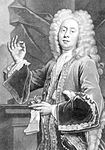Henry The Second, King Of England; With The Death Of Rosamond is a 1692 historical play often attributed to William Mountfort but possibly written by John Bancroft. It was first staged at the Theatre Royal, Drury Lane by the United Company. The prologue and epilogue were written by John Dryden. Some incidental music was composed by Henry Purcell.

Amphitryon is an English language comedy by John Dryden which is based on Molière's 1668 play of the same name which was in turn based on the story of the Greek mythological character Amphitryon as told by Plautus in his play from ca. 190-185 B.C. Dryden's play, which focuses on themes of sexual morality and power, premiered in London in 1690. Notable innovations in Dryden's adaptation compared to previous plays on Amphitryon included music by Henry Purcell and the character of Phaedra, who flirts with Sosia but is eventually won over by Mercury's promises of wealth.

The Squire of Alsatia is a 1688 comedy play by the English writer Thomas Shadwell. Alsatia was a nickname for the Whitefriars area of London, deriving from Alsace in northeastern France. A restoration comedy, it was performed at the Drury Lane Theatre by the United Company following on from John Crowne's Darius, King of Persia. One of the best-remembered roles, that of the shrewish Mrs. Termagant was first performed by Elizabeth Boutell. It was revived numerous times during the eighteenth century.
The Biter is a 1704 play by the English writer Nicholas Rowe. Rowe was better known for his tragedies but chose to try his hand at comedy. Performed at the Lincoln's Inn Fields Theatre, it was not a great success and lasted for about six performances. It was overshadowed by the more popular The Careless Husband by Colley Cibber, which appeared at the Drury Lane Theatre. It was Rowe's only play in a contemporary setting, and he rapidly turned back to historical tragedies beginning with Ulysses (1705). Some sources reported Rowe defiantly and loudly laughing at the jokes during a performance, even while nobody else did.

Greenwich Park is a 1691 comedy play by the English writer William Mountfort.
The Successful Strangers is a 1690 tragicomedy by the English writer William Mountfort.
Regulus is a 1692 tragedy by the English writer John Crowne. It portrays the career of Marcus Atilius Regulus, a Roman Consul at the time of the First Punic War. A separate play of the same title was written by William Havard in 1744.
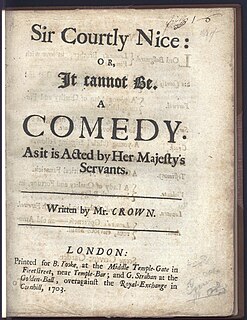
Sir Courtly Nice: Or, It Cannot Be is a 1685 comedy play by the English writer John Crowne. Rehearsals by the United Company were underway when the death of Charles II in February led to the closure of all theatres as a mark of respect. The play was eventually staged on 9 May at the Theatre Royal, Drury Lane. It is the tradition of the Restoration Comedy. A popular hit it became a stock part of the repertoire for more than a century, with Colley Cibber and Anne Oldfield appearing in a celebrated 1709 revival.
A Very Good Wife is a 1693 comedy play by the English writer George Powell. It was first performed by the United Company at the Theatre Royal, Drury Lane with a cast that included Powell as Courtwitt, John Hodgson as Wellborn, William Bowen as Squeezwit, George Bright as Venture, Joseph Haines as Sneaksby, Colley Cibber as Aminadab, Susanna Mountfort as Annabella, Frances Maria Knight as Widow Lacy, Elinor Leigh as Mrs Sneaksby.
The Marriage-Hater Matched is a comedy play by the English writer Thomas D'Urfey. It was first staged by the United Company at the Theatre Royal, Drury Lane in January 1692. The original cast included John Bowman as Brainless, William Mountfort as Sir Philip Freewit, Samuel Sandford as Limber, John Hodgson as Darewell, Anthony Leigh as Myn Here Van Grin, George Bright as Bias, Thomas Doggett as Solon, William Bowen as Callow, Colley Cibber as Splutter, Elizabeth Barry as Lady Subtle, Katherine Corey as Lady Bumfiddle, Anne Bracegirdle as Phoebe, Charlotte Butler as La Pupsey and Abigail Lawson as Margery.
Sir Anthony Love; Or, The Rambling Lady is a 1690 comedy play by the Irish writer Thomas Southerne. It was originally staged by the United Company at the Theatre Royal, Drury Lane with a cast that included Susanna Mountfort in a breeches role as Sir Anthony Love, William Mountfort as Valentine, Joseph Williams as Ilford, William Bowen as Sir Gentle Golding, Anthony Leigh as An Abbe, John Hodgson as Count Canaile, Samuel Sandford as Count Verole, George Bright as Waitwell, Colley Cibber as Servant to Sir Gentle, Charlotte Butler as Floriante, Anne Bracegirdle as Charlote and Frances Maria Knight as Volante. The play's incidental music was composed by Henry Purcell.
Love For Money; Or, The Boarding School is a 1691 comedy play by the English writer Thomas D'Urfey. It was originally staged at the Theatre Royal, Drury Lane by the United Company. In 1733 it was adapted into a ballad opera The Boarding School by Charles Coffey.

Don Sebastian, King Of Portugal is a 1689 tragedy by the English writer John Dryden. It is based on the reign of Sebastian of Portugal leading up to his defeat and death at the Battle of Alcácer Quibir in 1578. An Elizabethan play The Battle of Alcazar also portrays the events.

The Wives Excuse also The Wives Excuse; Or, Cuckolds Make Themselves is a 1691 comedy play by the Anglo-Irish writer Thomas Southerne. The title is sometimes written more grammatically as The Wives' Excuse.
The Maid's Last Prayer: Or, Any Rather Than Fail is a 1693 comedy play by the Irish writer Thomas Southerne. It was first staged at the Theatre Royal, Drury Lane by the United Company.
The Massacre of Paris is a 1689 tragedy by the English writer Nathaniel Lee. It was first staged by the United Company at the Theatre Royal, Drury Lane. It is based around the 1572 St. Bartholomew's Day massacre which led the killing of many Huguenots during the French Wars of Religion. The events had previously been portrayed in Christopher Marlowe's Elizabethan play The Massacre at Paris.
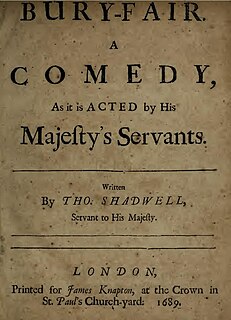
Bury Fair is a 1689 comedy play by the English writer Thomas Shadwell. It is part of the tradition of Restoration Comedy that flourished during the era. It was first staged by the United Company at the Theatre Royal, Drury Lane in London.
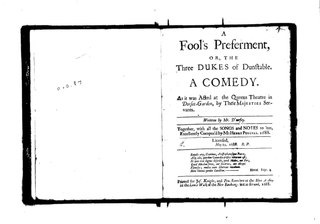
A Fool's Preferment; Or, The Three Dukes Of Dunstable is a 1688 comedy play by the English writer Thomas D'Urfey. It is a reworking of John Fletcher's Jacobean work The Noble Gentleman. It was first performed by the United Company at the Dorset Garden Theatre in London. Henry Purcell composed the play's incidental music. It was his first major work composingfor the theatre in seven years since Sir Barnaby Whigg.
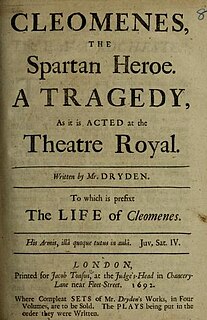
Cleomenes, the Spartan Hero or Cleomenes, The Spartan Heroe: A Tragedy is a 1692 tragedy by the English writer John Dryden. It was first staged at the Theatre Royal, Drury Lane by the United Company. It portrays the reign of Cleomenes, the King of Sparta, inspired by Plutarch's history of the period. Dryden's version is strongly Jacobite in drawing parallels from his overthrow to the recent Glorious Revolution in England. Because of this it was temporarily banned by the authority of Queen Mary.
King Edward The Third; With The Fall Of Mortimer, Earl Of March is a 1690 tragedy, generally attributed to the English writers John Bancroft and William Mountfort. It was first performed by the United Company at the Theatre Royal, Drury Lane in London. It portrays the early years of the reign of Edward III and his defeat and execution of Roger Mortimer, Earl of March.










